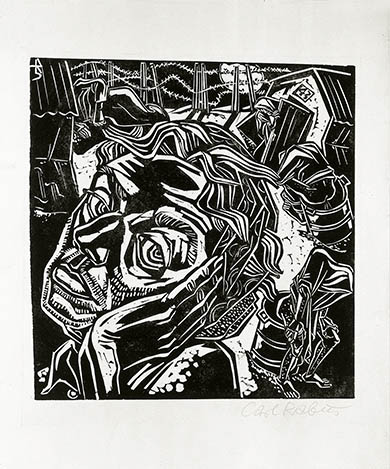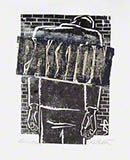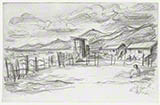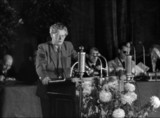Saint-Cyprien internment camp
Saint-Cyprien internment camp
Das Camp de Saint-Cyprien […] war gewiß nicht eines der ärgsten dieser Gattung. Geprügelt wurde nur gelegentlich, wenn die Wächter, verbiesterte Bauernburschen, sich gerade langweilten. Gestorben wurde an Typhus. Erschossen bei fahrlässigen Fluchtversuchen.
[The Camp de Saint-Cyprien [...] was certainly not the worst of its kind. The beatings were only administered occasionally when the guards, ill-tempered farm-hands, were bored. The dying was caused by typhus. The shootings were meted out for poorly-executed escape bids. (ed. trans.)]
Walter Mehring recalling his time in Saint Cyprien, 1979
The Saint-Cyprien camp in southern France was hastily constructed in early 1939 for Spanish Civil War refugees in the coastal town of the same name. The Mediterranean Sea provided a natural border. The other three sides of the camp were bordered by barbed wire. The camp consisted of wooden sheds that offered no protection, either from the cold or the wind. Only in mid-1940 were barracks built. Even so, Saint-Cyprien remained a provisional construction to the end. There was too little of everything: from drinkable water, food and hygiene articles through to sanitary facilities. Vermin and disease (typhus, malaria, dysentery) thrived as a result, and caused many deaths.
After German troops invaded Belgium, "potentially hostile foreigners" were taken to the Franco-Belgian border where they were handed over to the French authorities and transferred to Saint-Cyprien.
Among the artists in the camp were the writer Erich Weinert and Walter Mehring, the musician Eberhard Schmidt and the painters Felix Nussbaum, Karl Schwesig, Leo Breuer and Carl Rabus. To counteract the monotony of camp life, the prisoners organised (as best they could) language courses, religious hours or musical and literary evenings.
At the end of October 1940 the camp was destroyed by a storm and four days of rain; it was closed on 31 October 1940. The more than 3,600 prisoners were moved to the Gurs internment camp.





